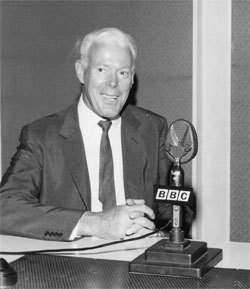English and American Words 21 August 1988
Trevor Leggett was head of the Japanese Department of the BBC.

This is one of his broadcasts to Japan
Zubari for 21 August 1988
Hello listeners!
Hello listeners! I am often asked by Japanese about the differences between American and English. They say: “Are there many American words coming into English now, as exports?” I often reply: “There are many words coming from America to England, but…”
It is well-known among students of the English Language, that many words which were in general use in the 17th century have now become archaic and obsolete in Britain. But when the great wave of emigrants went from Britain to America in the 17th century, they took these words with them. The language there was more conservative, not more flexible. So, these English words remained in use in America, when they had died out in Britain. When we hear Americans saying them, they seem like new words or rather, new meanings. The words themselves tend to be still part of English vocabulary, but they have lost their original meaning.
For instance, to an Englishman, “mad” means “insane.” But Americans often use to it mean “angry”. “I got mad” means “I got angry” when an American says it. An Englishman would not say that, because it would mean “I became insane”. But “mad” meaning angry was part of the standard English vocabulary in the 17th Century.
So, we can say that these “American” words are not imported – but they are being re-imported. We once exported them to America, and now they are coming back!
There are also some grammatical usages which are wrong by present-day grammar, but which were standard English in the 16th and 17th centuries. Some of them have been preserved in America.
For instance, “between you and I”. This means: “This is a secret between us – do not say it to anyone else”. But the form “between you and I” is grammatically wrong – it should be “between you and me”. After the preposition “between”, as you know, it is the accusative case of pronouns which is correct. For instance, we must say “between them” and not “between they”, and we must say “between him and her”, and not “between he and she”. But in the 16th century, “between you and I” was an exception in general use – Shakespeare uses it in his play “Antony and Cleopatra”.
When I was a cheeky middle-school boy, I read about this fact. So, in my next English essay, I deliberately wrote as part of a sentence “between you and I”. The English language teacher, who was a very strict grammarian, was quite annoyed, as I had expected. He scolded me in front of the class – again as I had expected.
Then I said, “But Sir, Shakespeare writes between you and I.”
“Where?” he said.
“In Antony and Cleopatra, Sir,” I replied.
He thought a little, and then he said, “Shakespeare sometimes uses grammatical forms which are irregular.”
So, I persisted, “But Sir, it can’t be wrong to write as Shakespeare did, surely?”
He looked me and snapped, “Shakespeare didn’t have to pass examinations in English. But you have to pass them – so write “between you and me.”
Well, listeners, till next time,
Sayonara.
© Trevor Leggett